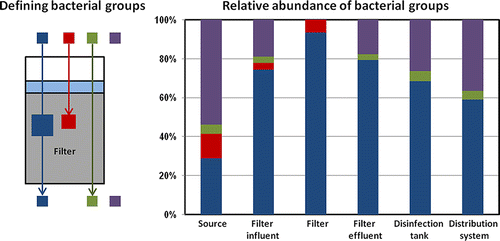Leveraging bacteria in drinking water to benefit consumers

Contrary to popular belief, purified drinking water from home faucets contains millions to hundreds of millions of widely differing bacteria per gallon, and scientists have discovered a plausible way to manipulate those populations of mostly beneficial microbes to potentially benefit consumers. Their study appears in ACS' journal Environmental Science & Technology.
Lutgarde Raskin and colleagues Ameet Pinto and Chuanwu Xi explain that municipal water treatment plants typically try to minimize the growth of microbes in the huge filters that remove small particles and substances that can serve as nutrients for bacterial growth. These facilities also add chlorine or other disinfectants to kill bacteria and prevent them from thriving in water distribution pipes. Nevertheless, it's not possible to totally eliminate bacteria with current technology, making it important to determine how the filter and other water treatment steps impact the types and amounts of bacteria that remain. That's why the researchers set out to do this in a study at a treatment plant in Ann Arbor, Mich.
Their research provides suggestions on how to change which bacteria wind up in the drinking water. The scientists found that certain types of bacteria attach to the filters where they form biofilms from which small clumps can break off and make it into the drinking water supply. The water's pH was a strong factor in determining which bacteria made it into the drinking water. Measures as simple as varying the water pH or changing how the filters are cleaned, for example, could help water treatment plant workers shift the balance toward bacteria that are beneficial for humans by not allowing the harmful bacteria to compete.
More information:
“Bacterial Community Structure in the Drinking Water Microbiome Is Governed by Filtration Processes”, Environ. Sci. Technol., Article ASAP
DOI: 10.1021/es302042t
Abstract
The bacterial community structure of a drinking water microbiome was characterized over three seasons using 16S rRNA gene based pyrosequencing of samples obtained from source water (a mix of a groundwater and a surface water), different points in a drinking water plant operated to treat this source water, and in the associated drinking water distribution system. Even though the source water was shown to seed the drinking water microbiome, treatment process operations limit the source water’s influence on the distribution system bacterial community. Rather, in this plant, filtration by dual media rapid sand filters played a primary role in shaping the distribution system bacterial community over seasonal time scales as the filters harbored a stable bacterial community that seeded the water treatment processes past filtration. Bacterial taxa that colonized the filter and sloughed off in the filter effluent were able to persist in the distribution system despite disinfection of finished water by chloramination and filter backwashing with chloraminated backwash water. Thus, filter colonization presents a possible ecological survival strategy for bacterial communities in drinking water systems, which presents an opportunity to control the drinking water microbiome by manipulating the filter microbial community. Grouping bacterial taxa based on their association with the filter helped to elucidate relationships between the abundance of bacterial groups and water quality parameters and showed that pH was the strongest regulator of the bacterial community in the sampled drinking water system.
Journal information: Environmental Science & Technology
Provided by American Chemical Society


















